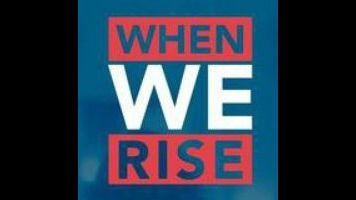“Each generation has its own epic confrontations it must deal with,” narrates Cleve Jones (Guy Pearce) over the opening scenes of Dustin Lance Black’s When We Rise. When he makes this statement—one that’s as sweeping as it is non-specific, which could also describe chunks of this eight-hour television event—it’s 2006, but it could be shared at any point in his life or the viewer’s. But Jones is speaking to a twentysomething interviewer who knows enough to profile the real-life prominent AIDS and LGBT activist, but seems otherwise woefully undereducated about a struggle he’s inherited and that Jones has lived through. The older man gently chides him—and, by extension, his generation—for his ignorance, but then patiently tells the kid a story more than 40 years in the making, that nevertheless has many chapters still unwritten.
When We Rise isn’t laboring in another production’s shadow, though; instead, it tries very hard to bring all of those moments and history makers to light. This is obviously a huge undertaking, one that traces the converging paths of gay activists who thwarted Prop 6, were later devastated by the rise of AIDS, but then rallied back to win marriage equality in 2015. Those battles weren’t all fought by the exact same people, which pushes the scope of the miniseries even further. But a central trio of characters anchors the story, which runs through four decades (1971 to 2015, roughly). There’s the aforementioned Cleve, a peace movement holdover; Roma Guy (Emily Skeggs), a lesbian feminist who heads West for more intersectionality; and Ken Jones (Jonathan Majors), who’s the most “othered” of these outsiders. A gay, black Navy man, Ken must contend with homophobia in the black community and racism among the San Francisco gay enclaves he struggles to join.
As Cleve says, “Everything we read told us that San Francisco is where we, the ‘us’es, could find safe harbor,” and the Bay City is very much the locus here. The interwoven storylines work well in the first half of the miniseries, whose protest scenes look less like the past than a glimpse of the future with each passing executive order. But whether it’s out of obligation or just a passion for the material, Black’s miniseries presses onward, into the ’80s and ’90s, when the curious case of “gay-related immune deficiency” turned into the AIDS epidemic, before ending in 2015 with a Supreme Court ruling for marriage equality. And here’s where it starts to unravel—not only are the time jumps less consistent in their intervals, but the core cast is replaced with Pearce as Cleve; Mary-Louise Parker as Roma; and Michael Kenneth Williams as Ken. These are very talented actors, and their arrival should feel more welcome, but it’s actually pretty discordant. There’s not an underwhelming performance in the house, but the young and middle-age versions of the characters don’t quite sync up.
But for such subject matter to appear on a major broadcast network—even with a presidential preemption—is a victory in itself. When We Rise is bound to have a long shelf life, one that, just like its fellow ABC miniseries, Roots, will include classroom airings and discussion. The miniseries seems cognizant of the latter, as it tries to construct a comprehensive history lesson that still has plenty of intimate moments to help viewers empathize or at least realize that these were the setbacks and successes of real people. It also attempts to remain family-friendly while pushing the boundaries of gay sex scenes on network TV. The result isn’t quite a sanitized account, but there’s a sense that punches are being pulled. Which is surprising, given the powerful filmmakers and producer behind the camera: Black traded off directing duties with Gus Van Sant, Dee Rees—who made her debut with Pariah—and The West Wing’s Thomas Schlamme.
Black and his team deserve high marks for their effort, but despite the pedigree, this collaboration isn’t a runaway success. Van Sant and Rees helmed the first two installments, which are the most riveting and complementary. But nights three and four feel like their own TV movies with many small-screen conventions (or stumbling blocks), including an overabundance of exposition. When We Rise is a history lesson that would have benefitted from some editing, but that’s the conundrum: There’s no era or development that could really be cut without it seeming dismissive. So we end up with this sprawling narrative that loses urgency the longer it goes on, but not relevance. It does so at the cost of its momentum, but that probably wasn’t too high a price for Black to pay for this living record of social justice.














![HBO teases new Euphoria, Larry David, and much more in 2026 sizzle reel [Updated]](https://img.pastemagazine.com/wp-content/avuploads/2025/12/12100344/MixCollage-12-Dec-2025-09-56-AM-9137.jpg)


























